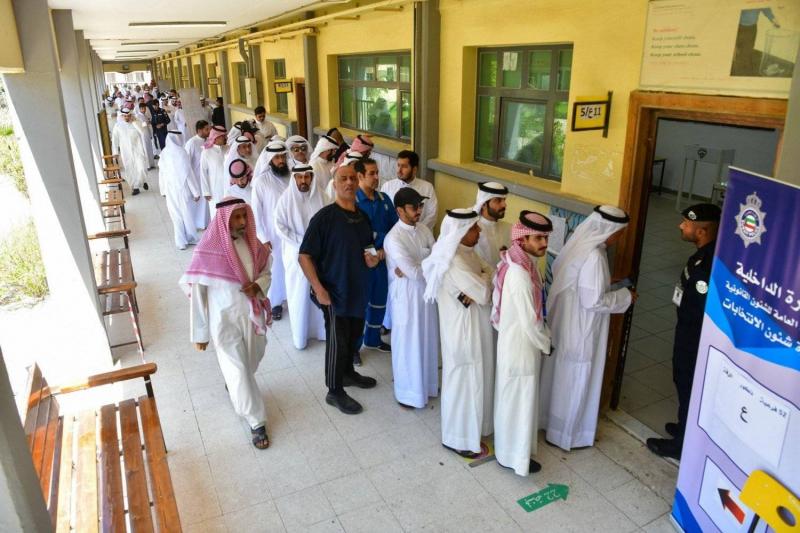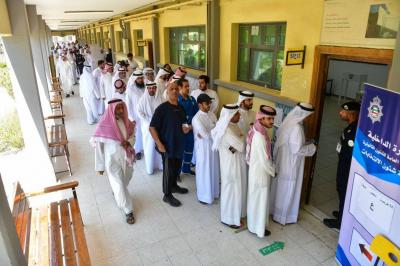In the fourth election the country has witnessed in four years, the Kuwaiti people demonstrated their significant integration with the political situation and their wide engagement with the electoral atmosphere. Despite the voting coinciding with the holy month of Ramadan, the polling stations saw high turnout, with attendance rates reaching 62.1%, according to the Ministry of Information (67% when accounting for eligible voters without excluding the number of suspended individuals, which reached 59,209). This high turnout resulted in notable leading figures and few, but significant surprises, as the second, fourth, and fifth districts broke previous attendance records, and the high turnout raised the success threshold across the five districts.
The percentage of change in the composition of the new council was 22% compared to the 2023 council, with the largest share of change in the first district at 40%, followed by 30% in the fifth, 20% in the fourth, and 10% in both the second and third districts. The results produced the rise of eight new figures: Muhammad Jawhar Hayat, Basel Al-Bahrani, Muhammad Al-Dahoum, Nawaf Al-Azmi, Anwar Al-Fikr, Badr Al-Dahoum, Muteb Al-Jalal, and Muhammad Al-Dosari, with the election of MP Janan Bushahri among 13 female candidates, thus maintaining the only seat for women in the National Assembly for 2024.
It was notable that the Islamic Constitutional Movement "Hadas" faced a strong setback, securing only one seat which went to Abdulaziz Al-Saqabi, compared to three seats in the 2023 council. In contrast, the Salafi bloc maintained its representation by successfully electing three candidates affiliated with the Salafi Islamic Gathering: Fahd Al-Masoud, Hamad Al-Ubaid, and Mubarak Al-Tasha.
On the level of sectarian, political, and social components, the number of Shiite bloc deputies increased from seven seats in the 2023 council to eight members in the 2024 assembly: Osama Al-Zaid, Muhammad Jawhar Hayat, Ahmad Lari, Basel Al-Bahrani, Saleh Ashour, Shuaib Shaaban, Janan Bushahri, and Hani Shams. The People’s Action Bloc returned with three deputies associated with it: Ahmad Al-Saadoun, Basel Al-Bahrani, and Muhammad Musaad Al-Dosari, but it lost the membership of Muteb Al-Rithan, while former MP Khalid Shahir Al-Mutairi lost in the fifth district.
Regarding tribal seats, the number of deputies from the Awazim tribe increased to six deputies compared to four in the previous council, by adding a second seat in the first district and securing a new seat in the second. The number of deputies from the Mutair tribe rose to five compared to four in the previous council, while the seats for the Rashid, Otaiba, Shammar, and Banu Hajar tribes remained the same as in the previous council. The Dhafir tribe regained a seat in the fourth district, and the Dawasir and Sahloun tribes returned to representation after years of absence, while the representation of the Ajman deputies decreased to two compared to four in the previous council, and that of the Anza tribe to one seat compared to three in the previous council.
As for district surprises, in the second district, former MP Hamad Al-Matar was ousted after serving in three consecutive councils (2020, 2022, and 2023). The fourth district recorded two surprises: the exceptional figure achieved by Shuaib Al-Muwaziri, and Anwar Al-Fikr ranking second despite competing in elections for the first time, surpassing 13 former deputies from the fourth district. In the fifth district, the first-place record set by Fahd Bin Jame was highlighted, along with the unexpected success of Muteb Al-Jalal Al-Suhli, securing third place despite being a first-time candidate. Another surprise was the exit of Muhammad Al-Huwaila from the council, who had previously succeeded in eight prior councils.
A total of 39 deputies returned to the parliamentary seats from the 2023 council, along with three deputies from previous councils: Dr. Obaid Al-Wasmi, Saleh Ashour, and Ahmad Nabil Al-Fadl. Conversely, seven deputies from the previous council lost their seats: Hamad Al-Madlj, Hamad Al-Matar, Hamad Al-Alyan, Muteb Al-Rithan, Abdullah Fhad, Muhammad Al-Mahan, and Muhammad Al-Huwaila. Additionally, Dawood Marafi, Hasan Jawhar, and Osama Al-Shahin declined to run, while Marzouk Al-Habini was disqualified.




